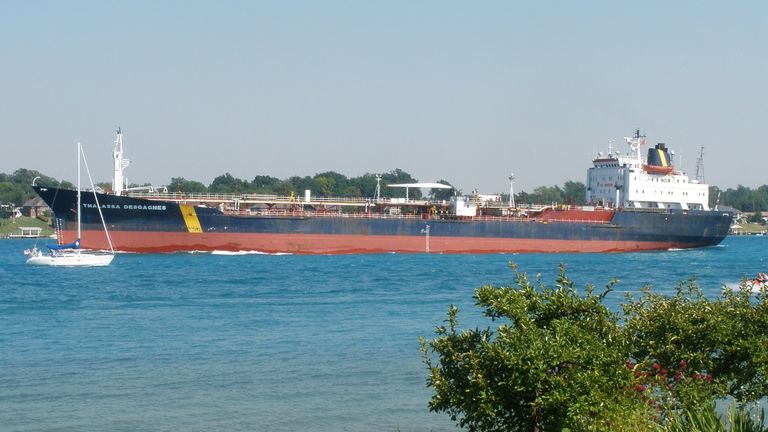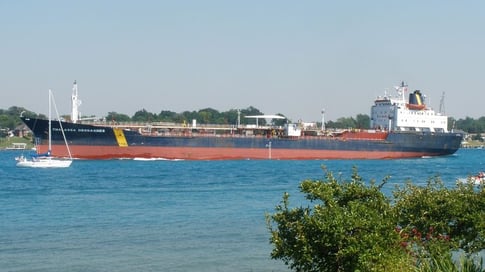7 min read
M/T ASPHALT PRINCESS - Analysis & recommendations
By: Sarah Knight on August 4, 2021 at 2:33 PM

Overview
Reporting indicates that the Panama-flagged MV ASPHALT PRINCESS (IMO 7382988) was boarded by armed personnel and seized whilst underway approximately 62nm East-Southeast of Fujairah. The incident was reported by UKMTO at 1230 UTC on August 3rd, described as a ‘potential hijack – non-piracy'.
The ASPHALT PRINCESS is owned by PRIME TANKERS LLC and managed by Glory International FZ-LLC, based in the United Arab Emirates.
Reporting suggests that MT ASPHALT PRINCESS was approached and boarded by 9 armed personnel before being ordered to sail toward Iran. Unconfirmed reporting indicates a VHF transmission was heard by neighboring vessels identifying as the MT ASPHALT PRINCESS stating that the vessel had been boarded by 5 – 6 Iranians and was now drifting.
As of 0230 UTC August 4th, the MT ASPHALT PRINCESS has resumed movement, navigating in a south-south-easterly direction away from Oman and Iran.
At 0430 UTC, UKMTO Watchkeeper reported that armed personnel had disembarked the vessel and that the vessel and crew were safe.

Analysis:
This latest incident comes amid heightened tensions resulting from the Iranian attack on the MT MERCER STREET incident on 29 July 21.
It is assessed that the temporary detention of the MT ASPHALT PRINCESS was a calculated show of strength by the Iranian Navy and ultimately unconnected to events concerning Israel and Iran, as played out in the attack on the MT MERCER STREET. Since July 2019 such incidents have proved relatively common, with 7 incidents of a similar nature occurring within the Persian Gulf and the Gulf of Oman. Whilst seemingly random and ultimately impossible to predict these events are, however, not representative of an increase in risk to wider commercial shipping.
Historically, the IRGC and Iranian Navy have conducted vessel detentions in a like-for-like manner or in response to either the detainment of Iranian vessels or Iranian linked economic activity. In both instances, Iranian forces have been able to assert their dominance within their immediate sphere of interest, which is a central goal for Iranian military operating within the Persian Gulf and the Gulf of Oman.
In July 2019, the British flagged MT STENA IMPERO was seized following the seizure of the Iranian tanker GRACE 1 by British Marines. In January 2021, Iran seized the South Korean tanker HANKUK CHEMI in response to the South Korean government freezing Iranian financial assets. On 12 August 2020 the MT WILA, managed by Greek company IMS SA, was boarded and detained by Iranian forces as a result of its connection to vessels linked through ownership to IMS SA that had been detained by the US.
Iran has consistently shown that in conducting this kind of operation, it is calculated in doing so, by targeting both vessels directly connected with ongoing disputes and those operating within the ‘grey space’ of legitimacy. On 13 July 2019, the MT RIHA was detained by Iranian forces for allegedly smuggling fuel. On 05 August 2019 and 16 September 2019, two unknown vessels were also detained for the same reason. On 17 August 2020, Iran detained a United Arab Emirates (UAE) registered ship for allegedly violating its territorial waters, adding that UAE coastguards killed two Iranian fishermen on the same day.
Whilst the detention of the MT ASPHALT PRINCESS can be accurately interpreted as a show of strength, there are multiple audiences at which this display is aimed. As Iran awaits the US, UK, and Israeli response to the attack on the MT MERCER STREET there is little in the way of advantage to be gained from conducting a limited show of force against a vessel connected to the UAE. For further explanation as to the timing and nature of this incident it is prudent to refer to internal relations within the Iranian military apparatus.
The Iranian Islamic Revolutionary Guard Corps (IRGC) and the more conventional military apparatus The Islamic Republic of Iran Army are fraught with conflict over divergent political and military ideologies and the allocation of scarce resources. The IRGC have a monopoly on economic and political power within Iran, with close ties to Supreme Leader Ayatollah Khamenei. Resultantly, in the 2020 budget, the IRGC received $6.96 billion whilst the wider Iranian conventional military received only $2.73 billion. In addition, the IRGC-N, the naval division of the IRGC, has recently commissioned and unveiled several vessels with the technological capabilities to sail in international waters, a domain typically reserved for the Islamic Republic of Iran Navy (IRIN).
On May 21st 2020, Rear Admiral Habibollah Sayyari, commander of Iran’s Military from 2007 to 2017, condemned the deliberate political and economic posturing of the IRGC, affirming the importance of the armed forces neutrality in political and economic affairs. Sayyari further noted that the Iranian Armed Forces resent the state propaganda that is primarily concerned with the sacrifices of the IRGC during the Iran-Iraq war, disregarding the losses suffered by the wider Iranian military during the conflict.
Such infighting and institutional rivalry is likely a strong and sufficient driver for the Iranian Navy to seek to conduct an operation like the detention of the MT ASPHALT PRINCESS. The considerable international and domestic focus so far on the actions of the IRGC will likely not have gone unnoticed by the Iranian Navy and thus it remains unsurprising that the Iranian Navy would seek to prove their utility within the Gulf of Oman by detaining the MT ASPHALT PRINCESS as the IRGC have done elsewhere.
Guidance for Vessels Operating Within the Gulf of Oman & Persian Gulf:
Dryad Global wishes to draw attention to U.S. MARITIME ADVISORY 2021-007.
Vessels operating in this area are advised to review security measures, ensure AIS is always transmitting (except in extraordinary circumstances, consistent with provisions of the Convention on Safety of Life at Sea), and monitor VHF Channel 16.
- If hailed by Iranian forces, U.S. flag commercial vessels should provide vessel name, flag state, and affirm that they are proceeding in accordance with international law as reflected in the Law of the Sea Convention.
- If Iranian forces seek to board a U.S. flag commercial vessel navigating these waters, the ship’s Master should, if the safety of the ship and crew would not be compromised, decline permission to board, noting that the vessel is proceeding in accordance with international law, as reflected in the Law of the Sea Convention, and immediately inform UKMTO / U.S. Fifth Fleet Battle Watch.
- If Iranian forces board any commercial vessel, the vessel should immediately contact UKMTO or the U.S. Fifth Fleet Battle Watch. The crew should not forcibly resist the boarding party.
Refraining from forcible resistance does not imply consent or agreement to that boarding.
The Maritime Global Security website at https://www.maritimeglobalsecurity.org/ offers industry issued best practices, including BMP5, guidance to mariners by geographic region, and provides contact information for regional maritime security reporting centres.
Vessels operating in this area are advised to establish contact with both UKMTO and the NAVCENT NCAGS Watch, and to include both on all update or incident report emails, as detailed above. By including both as addressees on each email, awareness will be enhanced without creating an additional reporting burden.
Contact Information:
- Fifth Fleet Battle Watch: + 973-1785-3879, and email details to: cusnc.bwc@me.navy.mil
- NAVCENT NCAGS: cusnc.ncags_bw@me.navy.mil or +973-1785-2983 or +973-1785-0084.
- UKMTO: watchkeepers@ukmto.org or +44 (0) 2392 222060. UKMTO advisories and warnings are available at http://www.ukmto.org/
- S. Coast Guard: Per 33 CFR 101.305, all suspicious activities, breaches of security, and transportation security incident events must also be reported to the U.S. Coast Guard National Response Center at +1-800-424-8802.
In the event of a security incident, follow reporting guidance in accordance with BMP 5, Section 7 and national authority.
When operating in the Middle East region, merchant shipping is encouraged to report through UKMTO, Telephone +44 2392 222 060 or email watchkeepers@ukmto.org
In addition to the guidance provided in BMP5, merchant shipping is encouraged to report the following to UKMTO as detailed in the IMSC Bridge Cards:
- Threatening or harassing conduct directed at a merchant vessel.
- Threatening or harassing language transmitted on VHF.
- Boarding or search of a vessel without a valid legal pretext.
- Unnecessary manoeuvring in unsafe proximity of a merchant vessel.
- Intentional close manoeuvring so as to restrict a vessel’s ability to manoeuvre without lawful justification.
- Aircraft (including drones) operating at an unsafe altitude or distance that results in a threat to a merchant vessel.
- Unprofessional or inappropriate queries – Queries that include asking questions beyond flagged state, port of departure and port of arrival. Including questions relating to:
- Whether warships or aircraft are operating in the area.
- Asking unnecessarily probing questions about the crew or cargo.
- Sighting of suspicious floating objects (possible mine or waterborne improvised explosive device) in the area.
- On receiving a distress call from another Merchant Vessel that reports being harassed or attacked.
Related Posts
IRGC say ship smuggling fuel seized in Gulf with..
ran’s Revolutionary Guards said Friday they seized another vessel smuggling fuel in the Gulf and..
Alleged Attack Against Israeli Owned Vessel..
Unconfirmed media reporting has indicated that the MV HYPERION RAY (IMO9690559), has been involved..
Is China at War in the South China Sea?
Recent incidents in the South China Sea highlight China's aggressive maritime strategy.



